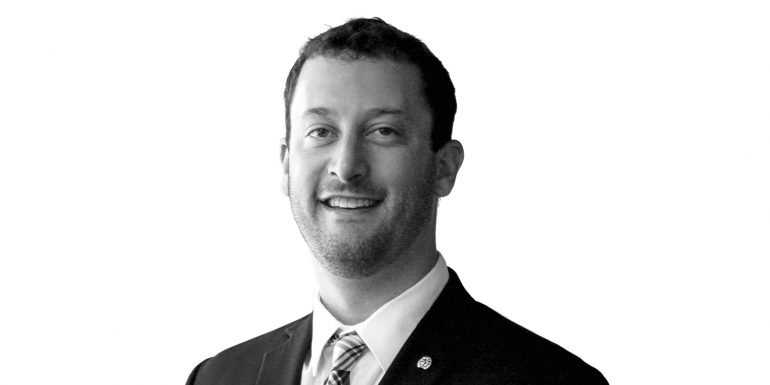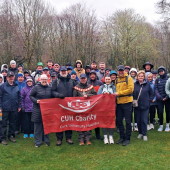5 Minutes with ... Eric Ottinger ACABE

US-based Eric Ottinger ACABE is a Construction and Real Estate Advisor at EY
Q Have you always had an interest in construction/engineering?
I grew up in a small town in Virginia with a dad who is a very hands-on, do-it-yourself kind of guy. When I was four, Dad designed and built our first house basically by himself on nights and weekends. I remember sitting on the grade beams learning how to swing a hammer. My parents still live in that house today. Throughout my young adult life, I kept working with Dad and learning the basics of construction. When the dot-com bubble hit, Dad got fed-up seeing his retirement account shrink and decided to start buying fixer-upper properties for rental. Of course, he needed a workshop to store all his tools, so we ended up building one that is bigger than our house (Mom still makes comments on that today). In college, I worked for a small, local contractor, where we built houses, did home repairs and small commercial tenant improvements.
Q What was your route into the profession?
I studied finance at college, expecting to go into investment banking. However, I graduated in 2008 during the global financial crisis, when finance majors had a very tough time getting jobs. But while I was in college, I’d taken a real estate class that gave me the hours to apply for a real estate salesperson licence (obviously not an optimal time to start selling houses either). I then worked for a broker for close to a year until I found a part-time opportunity with a local developer/asset manager that eventually led to a full-time position.
Q How did you come to work for EY?
Most of my career, I’ve worked as a project manager on real estate and construction projects. I was the construction manager (CM) for a few Mercedes dealership projects in San Francisco when a recruiter called in early 2018. He introduced me to EY’s Construction and Real Estate Advisory Services (CREAS) practice.
When I started with EY, I changed to more of a consulting role for short-term sprints rather than being a CM from inception to close-out. Engagements included construction audits, risk and operation assessments, cost management assignments and other specialised focuses within major capital projects. The cool part was that it gave me broad experience working on a wide array of challenges faced in mega- and giga-projects around the world. Two years later, our CREAS group started focusing on longer-term engagements. I’m now back to my project management roots and am the CM on a 12.5m square foot mixed-use development in Cupertino, California
Q What are the current challenges of your role?
There are a lot of moving parts with this project. We are still in the planning and entitlement phase, and are experiencing challenges making sure the project pencils, while still meeting our design criteria. We’ve gone through several rounds of value engineering to achieve the investors’ budget target. We also face changing regulatory requirements, as this is a six- to seven-year project and the California Building Code is updated every three years. To mitigate this, we keep a constant eye on the schedule and regulations, work with the city staff to reach a common consensus and push to fast-track our pre-construction efforts to enable an effective permitting process.
Q What question do you get asked most often?
People are often unaware of all the management aspects behind major construction projects, so I might have to go into a bit of detail when asked what I do. As EY is typically known as a Big Four accounting firm, it often also requires some additional explanation that I’m not an accountant.
Q Do you believe the industry will make full use of the technology that is available?
I believe our industry will continue to trend in that direction. I’m a huge advocate for ConTech and PropTech and have been on several engagements for organisational technology implementation. To remain competitive, companies must explore new structuring options, improve operational efficiency, and balance portfolios to maximise return on investment – all while mastering digital disruption and gaining a deeper understanding of customer preferences.
Construction firms typically have profit margins of 2-3%, compared with an average of 20% in other industries, so spending 1% of revenue on digital upgrades and innovation can seem a heavy and risky investment. However, failing to invest in solutions that could boost output is counterproductive.
The most innovative firms will invest and gain a critical strategic advantage.
We’ve seen an uptick in technology investment lately, with Covid-19 restrictions requiring new operational strategies. I’m very interested in digital twins and their potential to make exceptional improvements in the built environment.
Q What inspires you?
The increase in technology implementation and practitioners opening up to change has been really uplifting. And, as a CM, there is no feeling quite like driving by a development and thinking you helped build that. I’m looking forward to seeing completed projects that have really embraced new technologies and created a special user experience.
My current project incorporates this – 50% of the residential portion consists of 1,201 affordable housing units, embracing the social welfare of the community. We are also building one of the world’s largest rooftop parks (19 acres) to provide recreational outdoor space.
Q What is the biggest challenge facing the profession, in your opinion?
If you boil down every challenge in construction to a single root cause, you may arrive at data collection. Imagine if every data point was captured for every project in a comprehensive suite of technology. It could eventually eliminate design issues, safety concerns, schedule slippages, costing discrepancies, change orders and a multitude of other issues that every construction project faces.
Q What advice would you give your 20-year-old self?
Face challenges with a rational and positive attitude. If you keep working hard, keep pushing forward in an ethical manner and treat others with respect, you will end up much further in life than you can imagine when you are 20 years old.









